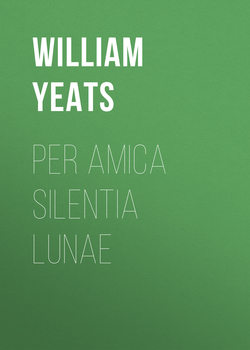Per Amica Silentia Lunae

Реклама. ООО «ЛитРес», ИНН: 7719571260.
Оглавление
William Butler Yeats. Per Amica Silentia Lunae
EGO DOMINUS TUUS
ANIMA HOMINIS
ANIMA MUNDI
EPILOGUE
Отрывок из книги
When I come home after meeting men who are strange to me, and sometimes even after talking to women, I go over all I have said in gloom and disappointment. Perhaps I have overstated everything from a desire to vex or startle, from hostility that is but fear; or all my natural thoughts have been drowned by an undisciplined sympathy. My fellow-diners have hardly seemed of mixed humanity, and how should I keep my head among images of good and evil, crude allegories.
But when I shut my door and light the candle, I invite a Marmorean Muse, an art, where no thought or emotion has come to mind because another man has thought or felt something different, for now there must be no reaction, action only, and the world must move my heart but to the heart’s discovery of itself, and I begin to dream of eyelids that do not quiver before the bayonet: all my thoughts have ease and joy, I am all virtue and confidence. When I come to put in rhyme what I have found it will be a hard toil, but for a moment I believe I have found myself and not my anti-self. It is only the shrinking from toil perhaps that convinces me that I have been no more myself than is the cat the medicinal grass it is eating in the garden.
.....
When I think of any great poetical writer of the past (a realist is an historian and obscures the cleavage by the record of his eyes) I comprehend, if I know the lineaments of his life, that the work is the man’s flight from his entire horoscope, his blind struggle in the network of the stars. William Morris, a happy, busy, most irascible man, described dim colour and pensive emotion, following, beyond any man of his time, an indolent muse; while Savage Landor topped us all in calm nobility when the pen was in his hand, as in the daily violence of his passion when he had laid it down. He had in his Imaginary Conversations reminded us, as it were, that the Venus de Milo is a stone, and yet he wrote when the copies did not come from the printer as soon as he expected: “I have … had the resolution to tear in pieces all my sketches and projects and to forswear all future undertakings. I have tried to sleep away my time and pass two-thirds of the twenty-four hours in bed. I may speak of myself as a dead man.” I imagine Keats to have been born with that thirst for luxury common to many at the outsetting of the Romantic Movement, and not able, like wealthy Beckford, to slake it with beautiful and strange objects. It drove him to imaginary delights; ignorant, poor, and in poor health, and not perfectly well-bred, he knew himself driven from tangible luxury; meeting Shelley, he was resentful and suspicious because he, as Leigh Hunt recalls, “being a little too sensitive on the score of his origin, felt inclined to see in every man of birth his natural enemy.”
Some thirty years ago I read a prose allegory by Simeon Solomon, long out of print and unprocurable, and remember or seem to remember a sentence, “a hollow image of fulfilled desire.” All happy art seems to me that hollow image, but when its lineaments express also the poverty or the exasperation that set its maker to the work, we call it tragic art. Keats but gave us his dream of luxury; but while reading Dante we never long escape the conflict, partly because the verses are at moments a mirror of his history, and yet more because that history is so clear and simple that it has the quality of art. I am no Dante scholar, and I but read him in Shadwell or in Dante Rossetti, but I am always persuaded that he celebrated the most pure lady poet ever sung and the Divine Justice, not merely because death took that lady and Florence banished her singer, but because he had to struggle in his own heart with his unjust anger and his lust; while unlike those of the great poets, who are at peace with the world and at war with themselves, he fought a double war. “Always,” says Boccaccio, “both in youth and maturity he found room among his virtues for lechery”; or as Matthew Arnold preferred to change the phrase, “his conduct was exceeding irregular.” Guido Cavalcanti, as Rossetti translates him, finds “too much baseness” in his friend:
.....